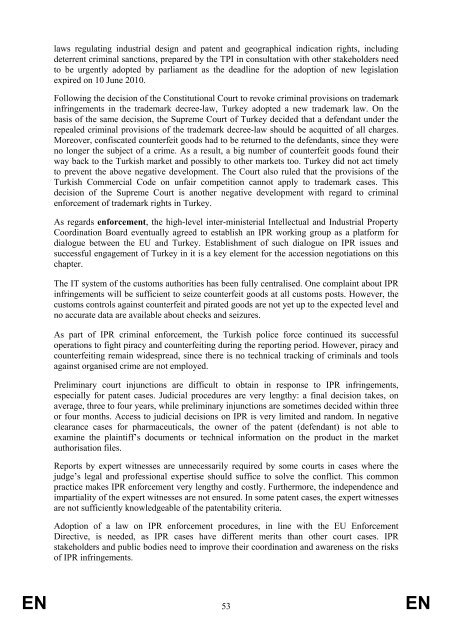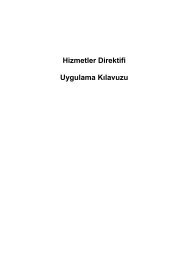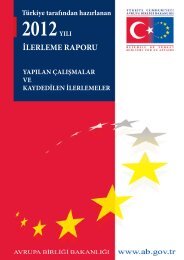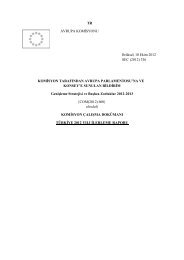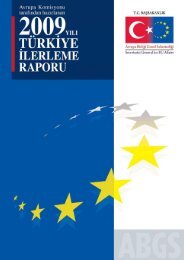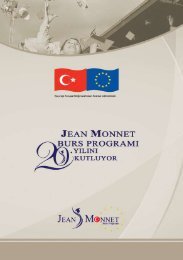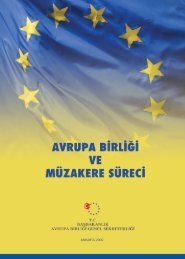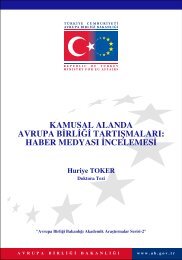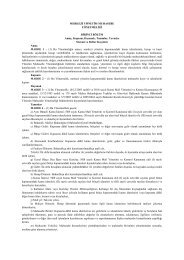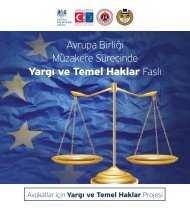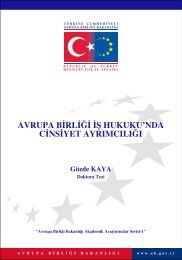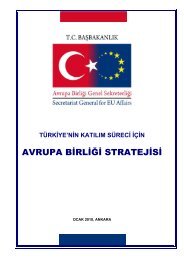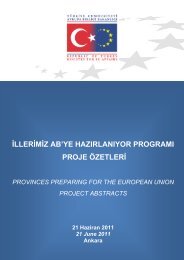2010 ilerleme raporu - Avrupa Birliği Bakanlığı
2010 ilerleme raporu - Avrupa Birliği Bakanlığı
2010 ilerleme raporu - Avrupa Birliği Bakanlığı
Create successful ePaper yourself
Turn your PDF publications into a flip-book with our unique Google optimized e-Paper software.
laws regulating industrial design and patent and geographical indication rights, includingdeterrent criminal sanctions, prepared by the TPI in consultation with other stakeholders needto be urgently adopted by parliament as the deadline for the adoption of new legislationexpired on 10 June <strong>2010</strong>.Following the decision of the Constitutional Court to revoke criminal provisions on trademarkinfringements in the trademark decree-law, Turkey adopted a new trademark law. On thebasis of the same decision, the Supreme Court of Turkey decided that a defendant under therepealed criminal provisions of the trademark decree-law should be acquitted of all charges.Moreover, confiscated counterfeit goods had to be returned to the defendants, since they wereno longer the subject of a crime. As a result, a big number of counterfeit goods found theirway back to the Turkish market and possibly to other markets too. Turkey did not act timelyto prevent the above negative development. The Court also ruled that the provisions of theTurkish Commercial Code on unfair competition cannot apply to trademark cases. Thisdecision of the Supreme Court is another negative development with regard to criminalenforcement of trademark rights in Turkey.As regards enforcement, the high-level inter-ministerial Intellectual and Industrial PropertyCoordination Board eventually agreed to establish an IPR working group as a platform fordialogue between the EU and Turkey. Establishment of such dialogue on IPR issues andsuccessful engagement of Turkey in it is a key element for the accession negotiations on thischapter.The IT system of the customs authorities has been fully centralised. One complaint about IPRinfringements will be sufficient to seize counterfeit goods at all customs posts. However, thecustoms controls against counterfeit and pirated goods are not yet up to the expected level andno accurate data are available about checks and seizures.As part of IPR criminal enforcement, the Turkish police force continued its successfuloperations to fight piracy and counterfeiting during the reporting period. However, piracy andcounterfeiting remain widespread, since there is no technical tracking of criminals and toolsagainst organised crime are not employed.Preliminary court injunctions are difficult to obtain in response to IPR infringements,especially for patent cases. Judicial procedures are very lengthy: a final decision takes, onaverage, three to four years, while preliminary injunctions are sometimes decided within threeor four months. Access to judicial decisions on IPR is very limited and random. In negativeclearance cases for pharmaceuticals, the owner of the patent (defendant) is not able toexamine the plaintiff’s documents or technical information on the product in the marketauthorisation files.Reports by expert witnesses are unnecessarily required by some courts in cases where thejudge’s legal and professional expertise should suffice to solve the conflict. This commonpractice makes IPR enforcement very lengthy and costly. Furthermore, the independence andimpartiality of the expert witnesses are not ensured. In some patent cases, the expert witnessesare not sufficiently knowledgeable of the patentability criteria.Adoption of a law on IPR enforcement procedures, in line with the EU EnforcementDirective, is needed, as IPR cases have different merits than other court cases. IPRstakeholders and public bodies need to improve their coordination and awareness on the risksof IPR infringements.EN 53 EN


